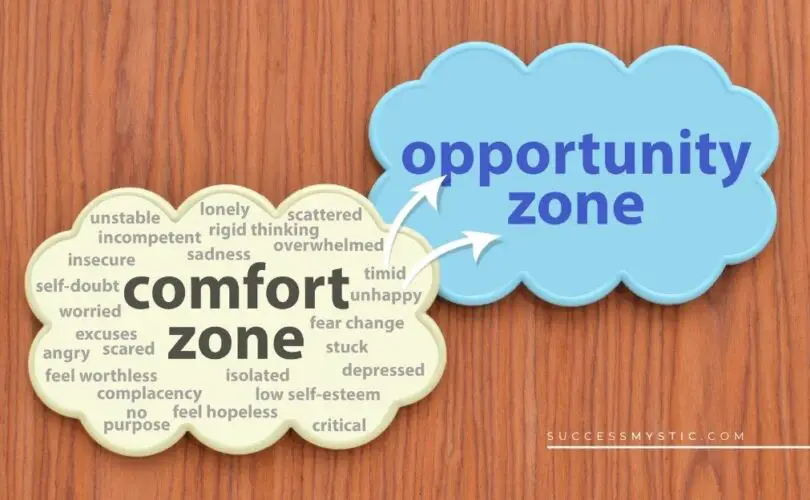These days, the idea of comfort is seen differently depending on what profession you work in, or which side of the isle you vote on. Some people think that we should always be comfortable, while some people seem to think that any time you are comfortable you’re missing out on some crucial part of life.
While there’s nothing wrong with being comfortable, this article will discuss some key benefits of going outside your comfort zone, both to grow as a person and to grow in your career and your relationships. At times, this article will also propose ways in which you can step out of your comfort zone to safely and gradually expand your it to reap those benefits that lie just beyond.
It might be best, however, to start out with a brief introduction to what comfort zones are, and why and how we form them.
What Is The Comfort Zone?
Different sources have slightly different definitions for what a comfort zone is, but a good basic working definition is to say that our comfort zones are sets of circumstances in which we feel calm and competent. Things in our comfort zones can include tasks that we are familiar with, interests that we have in music, films and literature, and our hobbies.
It’s all too easy to talk about the comfort zone like it’s a bad thing, which is unfortunate. While this article is ultimately about the benefits of going outside your comfort zone, it would be irresponsible not to say that everyone has a comfort zone, and it’s perfectly fine and healthy to spend even the vast majority of your time in your comfort zone, so long as you are able to leave the comfort zone when opportunity calls from outside.
Look at your comfort zone like a house: You spend a lot of time there, you sleep and eat there, but you have to leave your house to get things done. Sometimes you like to take some extra time in your house to relax, but you’d never want to live an entire life inside of it, and when you hear a knock at the door you probably go and answer it.
As we will discuss below, leaving your comfort zone can be exciting, fun, lucrative, and personally rewarding. Many opportunities for professional and personal advancement lie just outside of the comfort zone.
Reaping those rewards or achieving that advancement often involves stepping out of the comfort zone and expanding the comfort zone to accommodate new skills and behaviors, but few people endeavor to live outside of their comfort zones. The comfort zone is a place of confidence and peace where you can develop skills that you already have, or rest and recharge after a trip out of the comfort zone.
This is especially true when a trip outside of the comfort zone doesn’t go as planned. Nothing can get you back on your feet as fast as getting back to what you know, back to your comfort zone.
How Do We Form Our Comfort Zones?
We begin forming our comfort zones at a fairly young age as we begin to recognize what things we can do and what things we can’t do, or what things other people tell us we can and can’t do. Early in life these lessons can help us to stay safe, but because of how impressionable we are in our youth, these lessons sometimes stick with us well into adulthood, well after they’re practical.
As a result, things that we are afraid to do, or feel uncomfortable doing, often rub us the wrong way because of experiences that we had in our youth. Sometimes identifying these instances can help us to overcome our fears and inhibitions and step out of our comfort zones as adults. Sometimes these instances simply come to mind, while other times we need to think long and hard to identity them. Sometimes we need the help of a loved one or even a therapist to identify and confront those memories.
We don’t stop defining the borders of our comfort zones in our youth, however. Embarrassing or traumatic missteps at any stage in life can leave us unwilling to try new things, at least for a while. Whether it’s an accident that physically hurts you, a poor investment or workplace blunder that financially hurts you, or a relationship that doesn’t pan out and emotionally hurts you, your actions today – and their consequences – can be just as formative as when you were younger.
Sometimes people also have a hard time expanding or stepping out of their comfort zones because of an abusive relationship. In an abusive relationship, the abuser often tries to make the target feel insecure and worthless so that the target will feel that they are dependent on the abuser.
After enough time, the target can begin to feel as though they are week or stupid and incapable of doing certain actions. These situations can raise barriers on the borders of the comfort zone and can even make the comfort zone smaller as the target begins to believe that they cannot do things that they used to be comfortable with.
What Happens If We Spend Too Much Time In Our Comfort Zones?
Sometimes, we spend too much time in our comfort zones. This can happen for a number of reasons. Perhaps you have grown complacent with where you are and do not see the benefit in leaving your comfort zone, especially compared with perceived potential risks.
Perhaps your last trip outside of the comfort zone ended poorly, and now you are afraid to try again. Sometimes what we convince ourselves is complacency – or even happiness – is really just a fear to reach for anything more than what we already have for fear that we will lose it chasing dreams.
Whatever the reason for staying in our comfort zones, getting stuck in the comfort zone can manifest in a number of ways. Sometimes it’s passing up opportunities because you aren’t interested in the burden or don’t think that you would be able to keep up with the involved responsibilities. Sometimes it’s keeping to yourself because you don’t like meeting new people or trying new things and sometimes it’s settling into a routine that keeps you from experiencing new things.
Regardless of what it looks like, getting trapped in your comfort zone usually means that you stop advancing, at first professionally, and then personally, because of your aversion to doing new things.
If you are so unwilling to step out of your comfort zone that you pass up important opportunities or begin to lose touch with your personal relationships, consider seeking help to identify the reasons that you are afraid or unwilling to leave your comfort zone. Many communities have hotlines that can help you to identify these reasons or other resources that are more suited to your needs.
Reasons To Leave Your Comfort Zone
So, why is it so important to leave the comfort zone anyway? After all, it’s comfortable in there.
Just outside of the comfort zone is an area that some people are starting to call “The Courage Zone” or “Where The Magic Happens.” This is where we land when we step out of our comfort zones, and it’s where many exciting opportunities and experiences are waiting.
We are necessarily inside of our comfort zones when an opportunity arises that would require us to step out into The Courage Zone. Maybe you have been at the same level in your job for a while and you’ve gotten really good at it, so you are offered an opportunity that you are not sure that you are ready for. Or, if you are a younger reader, maybe you’ve done really good work in some of your classes and an instructor recommends more challenging course work, but you don’t want to lose your good grades or reputation.
Stepping out of your comfort zone does require some courage and some trust in yourself but because you are offered opportunities while you are in the comfort zone it is likely that you are truly ready to take advantage of those opportunities and the only thing holding you back is a lack of confidence in yourself.
Of course, you can also look for opportunities to step out of your comfort zone on your own. This is often done by “thrill-seekers” but there are even lower-risk ways to challenge yourself – but more on that later.
Expanding Your Comfort Zone
Think of your comfort zone as being composed of rings radiating out from the center, like a dartboard. Every ring of your comfort zone is a former courage zone—a place that you were once afraid to go. When you step outside of your comfort zone into the courage zone and become confident operating in those circumstances, that courage zone becomes the newest ring in your comfort zone.
This means that that things that formerly made you uncomfortable are now accomplished skills and that things that seemed to be in your distant future or your dizziest daydreams from the old perimeter of your comfort zone are now that much closer.
Achieving goals that were outside of your comfort zone also gives a sense of self-confidence that can make it easier to step out of the comfort zone in the future.
Sometimes, if you stay in the comfort zone long enough, you will build enough confidence for your comfort zone to gradually expand without ever needing to step into the courage zone. This can take a long time, however, and the fastest way to advance is to go outside of your comfort zone.
Taking your own steps and using your own initiative to leave your comfort zone also benefits you personally by increasing your sense of personal courage. If things work out, or even if they don’t, you will often feel personal accomplishment just for having left your comfort zone at all.
Actively leaving your comfort zone rather than waiting for it to passively expand also catches the attention of supervisors. Supervisors are there to offer you further opportunities – which will require further trips outside of the comfort zone – but they are also there to keep you from doing anything that you’re not ready for.
After all, leaving the comfort zone is healthy, but it is possible to go too far outside of it and get yourself into trouble.
6 Key Ways To Escape Your Comfort Zone
Every person and every situation is different – we all have our comfort zones for different reasons, and every opportunity to leave those comfort zones are different. For that reason, this article is going to address six key ways to escape your comfort zone.
Please read them all, as they might not all apply to you or a situation that you are likely to find yourself in but hopefully some of them will help you to get out of your comfort zone into the area around it which some call “the courage zone” and others simply call “where the magic happens.”
1. Recognize That You’re Not The Only One
We tend to think of our comfort zones as our own, things that no one else has. But read that language again and pay attention to the inclusive language. Everyone has a comfort zone, and the things that we are uncomfortable with are often very similar – things like presenting in front of groups or entering a room for of people that we don’t know.
Understanding that if you are out of your comfort zone everyone else probably is as well should help to make leaving your comfort zone a little less uncomfortable.
2. Take Small Steps
Usually, we can see departures from our comfort zones a mile away. The expectation that it will be uncomfortable convince many of us to simply not bother preparing, but like everything else, we can prepare for it with practice.
If you know that your career will eventually require you to – let’s say – do more public speaking, you can prepare for that in advance by trying to meet new people when you go out to lunch, or the movies. This still requires leaving your comfort zone but doing so on your own terms can make it more bearable.
3. Do Uncomfortable Things In A Comfortable Environment
Sometimes, when you can’t escape your comfort zone on your own terms you can still escape it on your own turf. If an opportunity arises to escape your comfort zone and it doesn’t require a specific venue, try to pick the location and make it somewhere you’re comfortable with. Whether that’s your office, your favorite restaurant, a park, wherever, doing something uncomfortable can be more comfortable if you do it in a place that you’re comfortable with.
4. Trust Your Decisions
You’re comfortable in your comfort zone. You probably know what to do there and when you know what to do people tend to take notice. Most of us are offered opportunities to step out of our comfort zones every day and many of us don’t because we’re scared.
An opportunity to step out of your comfort zone doesn’t have to be an opportunity that you look for or create yourself, it just has to be one that you recognize and that you accept because you trust yourself.
5. Allow Your Comfort Zone To Expand
Sometimes the external pressure can be greater than the internal pressure to escape your comfort zone. Society puts so much pressure on it, it can feel like you should just never be comfortable.
Sometimes by embracing the problems and engagements that we find inside of the comfort zone, we outgrow our comfort zones and expand the borders in an organic way. You should always test your limits to know that you can leave your comfort zone if that would be advantageous but charging out of your comfort zone into unexplored territory just because you read an article about the dangers of your comfort zone may land you in a situation that you are legitimately unprepared for.
6. Have Your Own Reasons
On a similar note, leaving your comfort zone can be more difficult if you don’t see the reason for it. Leaving your comfort zone is a lot easier if you have your own motivations for it – especially if those motivations are personal goals beyond just money or peer pressure.
How To Use Your Comfort Zone
This understanding of constantly expanding the comfort zone so that you can continually reach for more opportunities is the most common understanding of the benefits of going out of your comfort zone, but it is also a little aggressive. Expanding your comfort zone also has more defensive benefits.
We all have things that make us uncomfortable, and while they may prevent us from leaving our comfort zone, sometimes they can also enter our comfort zone. Just like we can take advantage of opportunities to step out of our comfort zone, there are ways for things to get in.
Maybe you’re comfortable with presenting information but a job requires you to fly somewhere – which is not in your comfort zone. Maybe you’re a competent public speaker but someone in the audience asks a question about a topic that you are not comfortable with.
By expanding our comfort zones, we can protect ourselves from some of these unforeseen intrusions. Of course, it’s not possible to be prepared for every possible intrusion into our comfort zones, but that uncertainty is a part of life that shouldn’t stop you from trying new things.
Leaving Your Comfort Zone Can Be Fun
As mentioned above, some of the key benefits of going outside your comfort zone aren’t necessarily that practical, namely it can be fun and exciting.
This is the reason that many people enjoy intense sports of outdoor recreation like scuba diving, mountain climbing, or skydiving – a common example of a sport that takes people outside of their comfort zone.
Meeting new people is also something that many people like to do, even if it involves stepping out of their comfort zone, which for many people it does.
Because everyone is different, every new person that you meet will also come with their own opportunities for you to expand your comfort zone by introducing you to interests and activities that you may not have any familiarity with. After all, things don’t need to be scary or dangerous to be uncomfortable. Listening to new music, going to new places, or seeing certain films can be uncomfortable – but more on that later.
If you’re interested in meeting new people to expand your comfort zone, consider joining community organizations like community gardens, service organizations, book clubs, or community events at your local library. All of these are settings where you’re likely to meet kind and unthreatening people.
Joining an organization based on your interests is a good way to meet people who share those interests, but joining organizations based on things that you might not be very familiar with can be another good way to expand your comfort zone by learning new things.
Comfort Zones And Safe Zones
Ironically, another great place to expand your comfort zone is in a “safe zone.” Safe zones started popping up in the last few years at university campuses in the United States as places where people could go without fear of being made fun of or confronted for their differences. Since then the concept has grown to include many churches, restaurants and coffee shops, community centers, and other locations.
While media sources critical of safe zones commonly portray them as places of complete homogeneity where people go in order to avoid confronting new ideas, safe zones are in fact populated by people of vastly different ethnic and religious backgrounds and widely differing political outlooks.
Because of the emphasis on not being offensive that pervades these safe zones, many people find them even more difficult places to start up conversations. Even if you don’t start up a conversation, spending time in these areas where people feel comfortable being themselves is often a good way to encounter very different people and to see common issues like race, religion, politics, and other hot points discussed from very different and often under-represented perspectives in a non-combative atmosphere.
Many of these locations will also have knowledgeable staff and educational materials that you can consult to learn about how to talk to people that frequent these locations, and what kinds of people are usually represented there.
Your Comfort Zone And Meeting New People
By the way, expanding your comfort zone can also make it easier to meet new people, whether personally or professionally. This article has said before that everyone has their own comfort zone. We make the things in our comfort zone and the things in our comfort zone make us. Think about how things that you enjoy – music, food, interests – become a huge part of your life.
If something that is in someone else’s comfort zone is not in your comfort zone, it can be difficult to get along with them – at least at first. And this goes the other way too. Someone else may not be as comfortable meeting you if one of your favorite things is outside of their comfort zone
Expanding your own comfort zone makes you more likely to get along with other people because you will have more in common with them – or at least a better understanding of your differences.
This makes it easier to meet and get along with people in social settings, but it also makes it easier to deal with people that we have to deal with, like people that we work with or bump into on the street.
Your Comfort Zone And Self-Confidence
Going outside your comfort zone can be a good way to develop self-confidence, which makes it easier to face daunting obstacles in the future.
While the things that scare you in your professional life and in your personal life may seem very different because of the very different contexts in which they occur, they often share common factors.
The fear of confrontation or argument, the fear of rejection or failure, the fear of meeting new people or admitting that you aren’t good at something or don’t know something, all of these are things that make people uncomfortable that may manifest in work or personal settings.
Encountering one of these situations in either setting can help to expand your comfort zone so that when you encounter a similar situation in another context you are readier for it.
Benefits Of Leaving The Comfort Zone
Going outside your comfort zone makes it easier for future ventures in more material ways as well. Most of the time when we go out of our comfort zones it is in order to achieve a new station in life, whether a new job, a promotion, or a new relationship.
Every new station in life also brings with it additional resources that make it easier to overcome future obstacles. Sometimes these are financial resources like a bigger budget or increased spending power.
Sometimes they are material resources like access to new technology or a larger staff. Sometimes they are personal resources like an increased social network that can offer you support or access to other opportunities or forms of assistance.
Learning From Mistakes
Going outside your comfort zone can also be an enlightening and educational experience, even if you don’t succeed in your tasks there.
Stepping outside of your comfort zone can help you to understand what things are like for people operating on a level other than your own. It can also give you a greater understanding of why things work the way that they do in your regular situation.
Having stepped out of your comfort zone might not expand your comfort zone if you don’t succeed in your goals there, but it can still make you more confident for the next time that you go outside of your comfort zone, even if you take some time to recover before you next adventure.
Tripping, and even falling after you step outside of your comfort zone can also be an educational experience in that it helps you to test your limits.
Sometimes the boundaries of our comfort zone are set where they are because we have low expectations of ourselves and don’t trust ourselves to take on tasks that we are perfectly prepared to do, while other times the boundaries of our comfort zones are set where they are because our minds are trying to protect us from doing things that we actually aren’t ready for.
It can be hard to tell the difference unless you try.
Of course, any time that you go outside of your comfort zone it should be a calculated risk. Going outside of your comfort zone doesn’t mean waging everything on whatever opportunity comes up.
It’s important to have the right attitude to learn from misadventures in the Courage Zone, however. These trips need to be seen as learning experiences rather than failures. A learning experience can be formative and educational, while a failure may just push you back into the comfort zone and make it more difficult to leave it the next time.
Of course, it’s easier to see things as failures if a great deal was lost. That brings us back to the idea of calculated risks, and of not putting everything on the line. Perspective is also important. We often see ventures as either failures or successes.
Many times, when we attempt something and “fail” we just end up back where we started with nothing lost but some time and effort. Fear of losing resources prevents us from making poor decisions but fear of losing dignity prevents us from making good decisions.
Leaving The Comfort Zone From Home
That isn’t to say, however, that you need to have anything at stake to step out of your comfort zone at all. Sometimes stepping out of our comfort zone means trying new and potentially dangerous things but sometimes you can step out of your comfort zone while sitting on your couch at home.
Books, movies, and even music can present us with challenging ideas that may be difficult for us to stomach but that can heighten our understanding of the world, or even of ourselves.
Emotionally challenging novels like “A Clockwork Orange” and “One Flew Over the Cuckoo’s Nest”, plays like “The Crucible”, and films like “The Purge” and “Requiem for a Dream” can all be difficult to engage with but offer understanding about the human condition and about ourselves that can’t be gained without some discomfort. If you’re not much for books and plays, all of the books and plays listed above were also made into movies – but maybe reading more will help to take you out of your comfort zone too.
Autobiographies and documentaries about difficult but formative times in history can also offer uncomfortable but important lessons that help us to understand the world that we live in.
Because the impacts of many difficult and traumatic historical events and periods are still felt by people living today, having a better understanding of this difficult content can also help you to understand the perspectives of people that you may know and work with.
How many people – possibly including yourself – form comfort zones is often largely the result of the social ramifications of historical events that it may be more comfortable not to think about like segregation, the holocaust, or other examples of persecution and conflict.
Final Thoughts
Hopefully, you now understand that going outside your comfort zone has many benefits, even beyond the material benefits that many people associate it with.
The material and financial benefits that many people associate with going outside of the comfort zone can’t be ignored, and indeed they shouldn’t be, but there are also significant personal and inter-personal benefits that come along with it.
Try to consider these additional benefits the next time that you are considering going outside your comfort zone.







